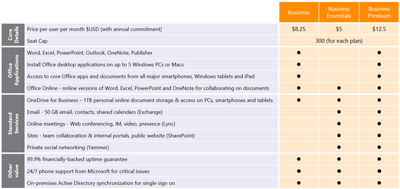News
Microsoft To Launch Three New Office 365 Plans
- By Kurt Mackie
- July 09, 2014
Microsoft plans to replace three current Office 365 plans -- Small Business, Small Business Premium and Midsize Business -- with new plans, effective Oct. 1.
The new plans will have different prices and some changes to use rights, Microsoft said in its announcement Wednesday. Existing customers will get a notice detailing the changes and when to move to the new services. New customers will be able to purchase the new plans on Oct. 1.
Price Changes
The new plans include Office 365 Business at $8.25 per user per month (replaces Small Business), Business Essentials at $5 per user per month (replaces Small Business Premium) and Business Premium at $12.50 per user per month (replaces Midsize Business). All of the plans require a one-year commitment.
Only one plan, Business, will have a price increase. It will cost $3.25 more than the Small Business plan, which is currently priced at $5 per user per month.
The other two plans will have price decreases. Business Essentials will cost $7.50 less than the Small Business Premium plan, which currently goes for $12.50 per user per month. Business Premium will cost $2.50 less than the Midsize Business plan, which currently is priced at $15 per user per month.
Feature Changes
Microsoft's announcement explained that "no capabilities will be removed or reduced" with the three new plans coming this fall. Microsoft actually added Yammer Enterprise social networking capabilities to its Office 365 Midsize Business and Office 365 Education plans earlier this week.
Those organizations currently subscribed to the Small Business or Small Business Premium Office 365 plans will get additional perks: the "seat" count will increase from the current 25 users to 300 users per subscription. Current Midsize Business subscribers won't see a seat-count change with the new plan, though. It will remain at the current 300 users.
A feature comparison table for the three current SMB plans can be found at this Microsoft page. Other than the seat count change, Microsoft is maintaining the basic features between the current and the new plans. The new Business and Small Business Premium plans appear to be oddly named, though, because they lack Active Directory integration.
Microsoft published the following chart showing the prices and features of the three new plans:
 [Click on image for larger view.]
Microsoft's new SMB Office 365 plans, available on Oct. 1, 2014.
[Click on image for larger view.]
Microsoft's new SMB Office 365 plans, available on Oct. 1, 2014.
While it's possible to move to the new plans this October, Microsoft's announcement recommended that current customers of the Office 365 SMB plans should wait to move to the new plans "at their first renewal after October 1, 2015," or exactly one year after the new plans get launched. Oddly, Microsoft downplayed the benefits of moving to the three new plans, explaining that "only a small number of customers with very specific needs would realize value from moving plans before October 1, 2015."
Microsoft claims that the new SMB plan changes were made in reaction to feedback from its SMB customers. The company's Office 365 Enterprise plans aren't changing.
In terms of its policies, Microsoft pledges not to change core aspects of a customer's Office 365 subscription without giving 12 months' advance notice. The situation is different, though, for organizations using Office 365 services with Enterprise Agreements. Those organizations have the same terms for the duration of the service, which can be more than one year. Microsoft recently made that distinction in its revised "Online Services Terms" document, which was released this month.
About the Author
Kurt Mackie is senior news producer for 1105 Media's Converge360 group.